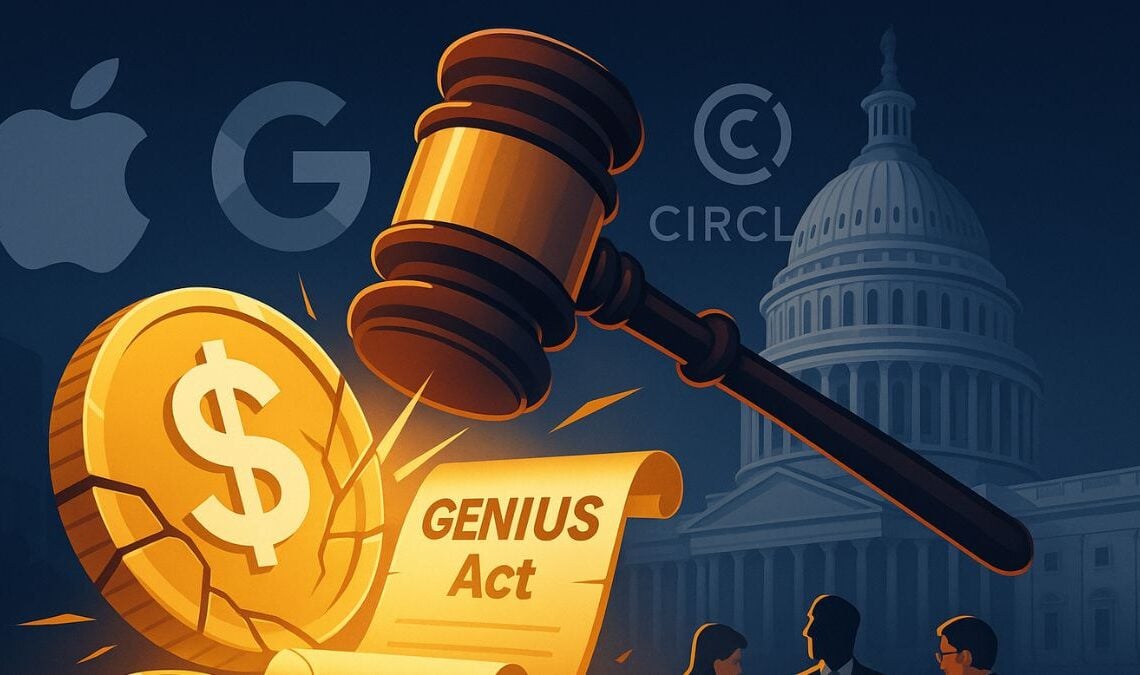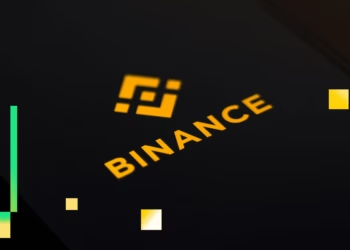The Genius Act is back in the spotlight as leading voices in the crypto industry express concern over Big Tech’s potential control of stablecoins. In a recent statement, Circle’s Chief Strategy Officer, Dante Disparte, warned that the bill could mark a turning point in the battle for financial decentralization.
Unveiled as part of a broader push for U.S. crypto legislation, the Genius Act includes a specific provision designed to block dominant tech companies and large banks from issuing their own stablecoins. According to Disparte, this restriction is not only timely, but necessary to ensure a healthy separation between tech infrastructure and monetary innovation.
“The Genius Act includes protections to avoid the creation of ‘Too Big to Fail’ stablecoin issuers,” Disparte said during a segment on Unchained, hosted by Laura Shin on July 15. He argued that without such measures, the sector could see monopolistic behavior from firms with both financial firepower and massive user bases.
Big Tech and Stablecoins: A Ticking Time Bomb?
Concerns about Big Tech’s entry into the stablecoin arena date back to Meta’s (formerly Facebook) Libra/Diem initiative, which sparked backlash from regulators around the globe. That project eventually collapsed under political pressure, but the underlying threat remains. With companies like Apple, Google, and Amazon continuing to integrate payment systems into their platforms, the risk of a tech-led financial ecosystem has not disappeared.
The Genius Act, officially titled the “Guarding the Economy and National Interests Using Stablecoins Act,” seeks to address this by introducing ownership thresholds and governance limits. Specifically, the bill prohibits entities from issuing stablecoins if they control over 20% of the user base, computing power, or governance rights of the underlying blockchain.
This approach mirrors principles used in traditional antitrust regulation, applying them to a Web3 context where network effects and data ownership can quickly tilt the balance of power.
Circle’s Position: Stablecoins Must Stay Decentralized
Circle, the issuer of USDC, has long advocated for a regulated but open stablecoin market. The company argues that transparent governance, reserve backing, and compliance are essential pillars—but centralization of access and infrastructure must be avoided.
Disparte’s comments add to a growing chorus of industry voices calling for balance between innovation and oversight. While the Genius Act could limit harmful consolidation, it also introduces regulatory burdens that smaller projects must navigate carefully.
“We can’t allow stablecoins to become another layer of platform monopoly,” Disparte emphasized, pointing to the risk of tech giants embedding their tokens into closed ecosystems—thereby locking out competitors and users alike.
Political Support and Challenges Ahead
The Genius Act has gained traction in the U.S. House, with several lawmakers viewing it as a pragmatic middle ground between full deregulation and overregulation. However, the bill still faces hurdles in the Senate, especially as debates heat up over the role of the Federal Reserve in issuing or supervising digital dollars.
Industry watchers suggest that bipartisan compromise will be essential for the bill to move forward. According to analysts at Paradigm Policy, the inclusion of safeguards against Big Tech control may be what ultimately earns the Genius Act enough support to pass.
Final Thoughts: Why the Genius Act Matters for Crypto
As stablecoins become an increasingly vital part of the crypto economy, the question of who controls them is more urgent than ever. The Genius Act offers a legislative framework to prevent monopolistic control, ensuring that no single company—no matter how powerful—can dominate this layer of financial infrastructure.Whether or not the bill passes in its current form, the message is clear: Washington is watching stablecoins closely, and the days of regulatory gray zones may soon be over.










